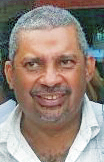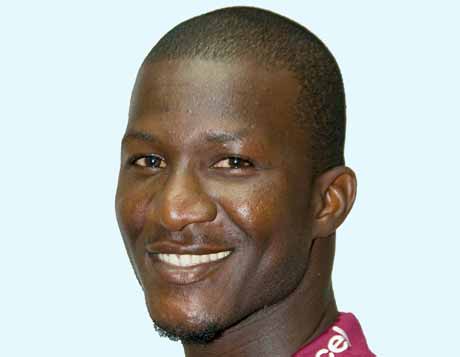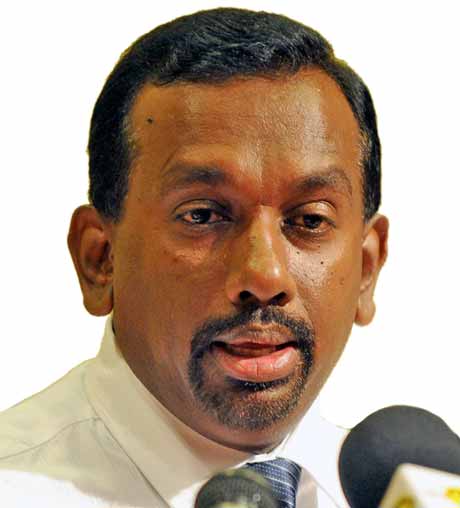May 4, 2011 issue
Cricket
the Year for 2010

Tony McWatt
In Caribbean vernacular, particularly amongst Trinidadians, 'comess' is a term used to describe utter confusion. As such given the events that have so far unfolded within the past year, there couldn't be a more apt term to describe the current state of cricket in the Caribbean.
During the last twelve months Caribbean cricket has been characterized by one crisis after another. First there was the controversy surround Chris Gayle captaincy and his eventually being relieved of that responsibility.

This was quickly followed by the somewhat surprising appointment of Darren Sammy as his replacement.
To cricket lovers throughout the Region and beyond, Sammy's appointment was surprising on at least two fronts. First off was the fact that the captaincy had been given to a player who was yet to command his place in the team. Far more worrisome was that he'd been given tenure through to the end of this year's forthcoming domestic Series against India in July.
As the first St Lucian ever to hold the post, Sammy's appointment was for a period longer than that given to any previous West Indies captain, including the likes of Frank Worrell, Gary Sobers, Clive Lloyd and Vivian Richards. The fact that it was made under the auspices of a West Indies Cricket Board (WICB) who's President Julian Hunte and Chief Executive Officer, Ernest Hilaire are also St Lucians has not been lost on its audience. Unfortunately this now seems to be just the latest example of the blatant insularity that has so often punctuated the rich history of West Indies cricket.
As fate would have it, Sammy's performances either with bat or ball have been, in the months since his appointment, woefully insufficient to justify his place in the team. As a result his role as captain has come under increasing scrutiny.
Since his appointment to the captaincy last November, ahead of the tour of Sri Lanka, Sammy has led West Indies in three Tests and 15 One-day Internationals. He has scored 10 runs from three innings in Tests, albeit they were rain-affected; and 132 runs at an average of 13.20 in ODIs since becoming captain. As a bowler he has also taken two Test wickets at 75.50 apiece, and 10 ODI wickets at 45.40 each with an economy rate of 4.63 in his time in the position.
Such poor statistics have resulted in ever increasing clamor for him to be relieved of the responsibilities. In a recent radio interview former captain Chris Gayle even suggested that the West Indies inglorious exit from the just concluded World Cup had been hastened by the imbalance in the team's composition that was created by the necessity of Sammy's otherwise unjustifiable inclusion as its must-play captain.
In contrast to several other country's captains who stepped down from their positions at the conclusion of the World Cup, such cries seem to be lost on Sammy. He has publicly stated his belief that the burden of leading the side has not impacted on his personal performance, and he still enjoyed playing the game. "At the end of the day, if I didn't think that I was capable enough to do the job, I wouldn't take it,"
As if its captaincy controversy wasn't enough to shroud Caribbean cricket in a cloud of uncertainty, there has also been ongoing public wrangling between the WICB, in the person of its CEO Mr. Hilaire and some of the West Indies team's most senior players. Following the West Indies failure to progress beyond the quarter-final stages of the World Cup, their Selectors reacted by announcing the non-inclusion of the team's three most senior batsmen Chris Gayle, Ramnaresh Sarwan and Shivnarine Chanderpaul from the squad announced for the Series against Pakistan.
The shock and controversy surrounding that decision was just as quickly followed by a series of back and forth accusations between first, Gayle, and then Chanderpaul and Hilaire as CEO, over the fairness and justification of their respective non-selection. Chanderpaul even went as far as to threaten the Board and its CEO with legal action for having, as he termed it, made public accusations capable of destroying his international cricketing career.
In the latest episode of this seemingly never ending soap opera former West Indies fast bowler, the legendary Andy Roberts, has chipped in with a public call for the resignations of both the WICB President Julian Hunte and its CEO Ernest Hilaire.
"The West Indies Cricket Board right now is taking our cricket backwards. We need people at the board who have the interest of cricket at heart and who can plan for cricket development. I think the president and the CEO are in the wrong place. They are in the wrong place at the wrong time....that is my personal feeling," said an irritated Roberts in a telephone interview.
The former West Indies pacer cited the decision and manner to axe the experienced players after the ICC Cricket World Cup as a classic example that Hunte and Hilaire were clueless about what they were doing. "I think this is a poor decision and the way they go about doing it."
Roberts felt that Hilaire getting involved in cricketing decision such as the matters with Chanderpaul and Gayle is the clearest example of what is plaguing the progress of West Indies cricket.
"That is exactly where we are going in the wrong direction. Has that got anything to do with the CEO? Isn't that a playing matter? Isn't that a function for the coach? Or the captain? How did the CEO get involved in that? So probably the CEO is picking teams too. Of course this is out of place. Whether he is the Chief Executive Officer, yes or no, if he feels that way, if he sees something call in the coach and let the coach make that release. That shouldn't be released from the CEO. I've never heard any CEO from around the world get involved in cricket like the way the West Indies' CEO has. So it wouldn't surprise me a lot if the CEO has a lot with Darren Sammy being captain and not the selectors."
Roberts' forthright comments are bound to stir further controversy within the Caribbean. The 'comess' that characterizes its cricket is therefore likely to continue for some time to come.
match-fixing allegations

Sri Lanka's sports minister on Monday ordered a police inquiry into match-fixing allegations levelled by former international captain Hashan Tillakaratne.
Tillakaratne, who played 83 Tests and 200 one-dayers during a 15-year career, said last week that Sri Lankan players had been involved in match-fixing since 1992 adding that he was prepared to name some of them.
"I have asked the inspector-general of police to investigate these claims and give a report to me," Mahindananda Aluthgamage told reporters after meeting cricket administrators Monday.
Tillakaratne, who skippered Sri Lanka between April 2003 and March 2004, stopped short of suggesting the 2011 World Cup final was rigged, although he expressed reservations about the team selection. Sri Lanka lost to India in last month's final.
"Match fixing is something which has been in this country over a period of time. This has spread like a cancer today," Tillakaratne was quoted as saying by Sri Lanka's Daily Mirror newspaper on Friday.
"There were threats of this issue being exposed at various times. But it was pushed down by giving money to various people.
"If the people who were responsible for that are listening to this, I state this today with great responsibility, I will shortly reveal the names of those responsible," he said.
However on Sunday, Sri Lanka's World Cup captain Kumar Sangakkara challenged Tillakaratne to prove his allegations.
"Hashan has played the game for years and he's captained Sri Lanka as well. So it's interesting to see what he has to say and if he has anything more than allegations," Sangakkara said in India.
Sangakkara, captain of the Deccan Chargers franchise in the Indian Premier League, said Tillakaratne should work with the International Cricket Council (ICC) if there was any basis for his allegations.
"It's dangerous to throw names around," said Sangakkara, who quit as captain after Sri Lanka's defeat to India in the World Cup final.
"He should work very closely with the ACSU (Anti-corruption and Security Unit) of the ICC and the home authorities to ensure that something's done about it if there is any foundation to those claims."
Tillakaratne's comments came as the sport tries to draw a line under last year's spot-fixing scandal involving some of Pakistan's leading players.
Indies losing run
Mohammad Hafeez' second career hundred was upstaged by rain and a blistering 76 from Lendl Simmons that condemned Pakistan to a one-run defeat under the Duckworth-Lewis Method in the fourth One-day International on Monday in Barbados.
Pakistan were left to nurse their wounds, when the inclement weather that has dogged the island over the last week interrupted, as West Indies were chasing a revised target of 223 from 39 overs.
For the West Indies it ended a run of eight straight defeats in this format of the game by Pakistan and a recent run of six successive defeats against all opposition.
A short ball from Pakistan captain Shahid Afridi was swung high over mid-wicket for six by Dwayne Bravo to formally carry West Indies to 154 for four – the exact total they required – from 29.5 overs under the D/L Method to claim their first victory of the series.
Pakistan lead the five-match series 3-1 with the final ODI to be played on Thursday at the Guyana National Stadium.
Pakistan had stumbled, after Hafeez struck seven fours and three sixes in the top score of 121 from 138 deliveries, and shared a century second-wicket stand with Asad Shafiq to lead the visitors to 248 for nine from their allocation of 50 overs.
After the Pakistanis were sent into bat on a hard, true Kensington Oval pitch under overcast skies, Hafeez anchored the batting, and reached his milestone from 128 balls with a flick through mid-wicket for a single off Ravi Rampaul in the 42nd over.
He added 153 for the second wicket with Shafiq, whose 71 from 102 balls contained four boundaries, before leg-spinner Devendra Bishoo continued to bowl impressively, taking three for 37 from his allotment of 10 overs to trigger a batting collapse.
The visitors lost their way in the last 10 overs, losing seven wickets for 66 runs, to slide from a comfortable 182 for two, with Dwayne Bravo taking two for 60 from his 10 overs, Kemar Roach two for 67 from 10 overs, and two run outs helping to undermine them.
Junaid Khan set West Indies back early, when he had makeshift opener Kirk Edwards caught behind for a first-ball duck in the second over.
But Pakistan were put on their heels, when Darren Bravo joined compatriot Simmons, and they put on 56 for the second wicket with a volley of strokes.
Tanvir Ahmed was the target for some special treatment from Bravo and Simmons, when they smote three fours and one six from his fourth over.
Khan made the breakthrough, when Bravo was caught at third man for 21, but Ramnaresh Sarwan, making a return to the side for the first time since losing his place following the World Cup, kept the momentum going with 28 in a stand of 75 with Simmons.
Hafeez showed his all-round ability, when he had Sarwan caught at long-off for 28 in the 25th over before Tanvir gained his revenge on Simmons, when the West Indies opener was caught on the cover boundary in the next over to leave the home team 135 for four.
Pakistan's bowlers tried to tie down the West Indies pair of the elder Bravo and Marlon Samuels, but they failed, and West Indies could celebrate a victory at long last.
on a downward spiral
Dear Editor:
I have been watching West Indies cricket for some time now, and I have seen mostly the lows of West Indies cricket. I have come to the realisation that the downfall of cricket in the West Indies is mainly, or wholly, the fault of the regional governing body, the WICB.
Okay, fine, let the past be the past, but I can't help but to comment on the state of our cricket.
Some of the decisions taken by the board, in particular the selectors, have baffled me and several cricket commentators such as West Indian great Michael Holding.
The main problem in the team right now is the captain Darren Sammy. How is it possible for a Test nation to have a captain that is not producing, neither in the bowling or batting department? In the home series which began in April, from the first two one-day internationals and the T20 international, he has made 48 runs off 65 balls in total and has taken one wicket in the T20 for 26 runs in three overs, while his economy rate in the ODIs is 4.94.
There are several other players that could have been drafted into the team who have the ability to produce more, but this cannot happen because Sammy is the captain. As stated by Holding regarding the third ODI, Ravi Rampaul cannot be included in the team because there has to be 'the captain'.
The state of West Indies cricket is spiralling downwards, and it starts from the top, from the selectors to the captain to the players. Why not choose a team first then select a suitable captain from the team? Maybe Darren Sammy is an inspirational leader, but surely one that does not lead from the front.
If it's inspiration the West Indies cricket team needs, why not keep him in the dressing room or get a motivational speaker? The West Indies need more persons like Michael Holding who are not afraid to air their concerns publicly so the WICB can see the mistakes they are making and thus come under some pressure.
Zac Williams, zac.scott.williams@gmail.com
(as at May 3, 2011)
Team Play Won Lost Tie NR Pts NRR
Kolkata Knight Riders 9 6 3 0 0 12 +0.588
Mumbai Indians 8 6 2 0 0 12 +0.582
Rajasthan Royals 9 5 3 0 1 11 -0.145
Chennai Super Kings 8 5 3 0 0 10 +0.247
Royal Challengers Bang 8 4 3 0 1 9 -0.052
Kochi Tuskers Kerala 9 4 5 0 0 8 -0.542
Deccan Chargers 9 3 6 0 0 6 -0.070
Delhi Daredevils 9 3 6 0 0 6 -0.262
Kings XI Punjab 7 3 4 0 0 6 -0.398
Pune Warriors India 8 2 6 0 0 4 -0.089
to host first int'l series
Afghanistan's cricket team will become the first foreign national side to play in Pakistan, two years after internationals were suspended over security fears, an official said Saturday.
International cricket has been suspended in Pakistan since March 2009, when gunmen attacked a convoy carrying the Sri Lankan cricket team in the eastern city of Lahore.
"Afghanistan will send its national team to Pakistan in July and play the Pakistan 'A' team, and hopefully this will benefit our team," Naseem Ullah Danish, chief executive of the Afghanistan Cricket Board, told AFP.
Danish met Pakistan Cricket Board officials in Lahore on Friday where they agreed to play a three-match one-day series, with games in Lahore, Faisalabad and Rawalpindi.
Five Afghan regional teams and their under-19 string are playing their domestic matches in the Pakistani border town of Peshawar, as their main grounds are being renovated.
Danish hoped Pakistan's second XI will also play in Afghanistan later this year.
"We have also invited the Pakistan 'A' team to Afghanistan for the inaugural match in Nangarhar where we have almost completed an international stadium," he said.
Since many Afghan players learnt their cricket in Pakistan they owe a great deal to the neighbouring country, Danish said.
"Pakistan has always been helpful to us and have helped us reach this far in international cricket," he said.
Most of the Afghan national team took up the game as refugees in Pakistani camps after Soviet troops invaded their country in 1979.
Afghanistan won the Inter-Continental Cup and the International Cricket Council's divisions five to one in the last two years, earning ICC one-day status and qualifying for the World Twenty20 held in the West Indies last year.
International teams were reluctant to tour Pakistan even before the Lahore attack, and the troubled country has since had to play its home matches at neutral venues in England and the United Arab Emirates.
The attack, which left eight people dead and wounded seven Sri Lankan players and their assistant coach, forced the ICC to strip Pakistan of its share of World Cup 2011 matches.
But Danish said security in Pakistan would not be an issue for his team.
"Security is not an issue and by playing in Pakistan we want to send out a positive message to the world and hope that teams come to Pakistan and play here," he said.